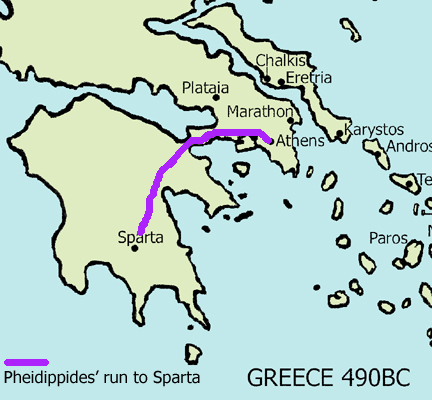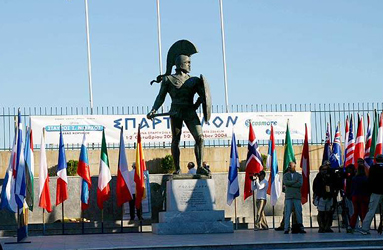The Landing at Marathon
The Persians had landed at last. It was early September, 490BC, and the Athenians had been waiting for this for a long time. They knew the Persian fleet would land somewhere in Attica, but where?
You might think they would just sail all the way round Attica and land close to Athens. There was a nice plain there suitable for horses. But the Athenians would have seen them coming a long way off, and could have attacked them while they were disembarking their thousands of men and horses, and all the other gear they needed, like tents and food.
So where? There were several other plains further away from Athens, and it is likely the Athenians would have posted sentries on top of the mountains around Athens. When the Persians finally landed at Marathon, a beacon fire was probably lit on Mount Pentelikon, so the citizens could see straight away what had happened.
What now?
Now they had to decide what to do about it. There were a few options. Which would you vote for?
1. Give in. The Persians had a much bigger army. They had beaten everyone they came up against so far en route to Athens. What chance did Athens have? If Athens fought and lost, they would suffer the same fate as Miletus, as Naxos, as Eretria. Athens and its temples would be burned, and the people killed or sent to be slaves for Darius. If Athens gave in, they would lose their democracy - their freedom to rule themselves - but they would live.
2. Hide in the Acropolis. The acropolis was a rocky hill in the middle of Athens - the sanctuary of Athena. Fifty years later the Parthenon would be built there. Most cities opposing Persia so far had defended themselves in a fort in this way. With Persia's advantage in numbers, it seemed unlikely Athens could win in an open battle. And if the army went out to fight the Persians at Marathon, that's what would happen, a battle in the open.
3. Go and fight at Marathon. Some citizens, including general Miltiades, argued that the hoplites should go and fight the Persians at Marathon. No one so far had successfully resisted the Persians in a siege. There was a water supply from a well, but the food would eventually run out, and everyone would starve. Meanwhile the Persians could burn down Athens and kill whoever hadn't managed to get into the Acropolis.
Miltiades argued it was much better to go and fight - hoplites were excellent fighters, fit and strong; they had better armour - bronze helmets and shields, unlike the leather or cloth protections of the Persians. And the phalanx was a pretty solid formation. It was more glorious to fight in open battle, and the gods would surely be on their side.
The Athenian citizens voted to go and fight at Marathon. (The map above shows the route they took.)


View of Mount Pentelikon today from Athens

The Acropolis
Pheidippides
Before setting off for Marathon, the Athenians decided to ask the Spartans for help. The Spartans were their allies against Persia, and their help would be extremely useful.
Sparta was about 150 miles away. What was the quickest way to get a message there? Ship? No, too slow. Horse? No, part of the route was very rocky and mountainous and too difficult for horses. So they sent a day runner, Pheidippides (actually his name was probably Philippides). Pheidippides was known for being able to run all day long, and that was his job, taking messages to other cities.
Amazingly, Pheidippides arrived in Sparta the next day. 150 miles in two days! Presumably exhausted, he asked the elders of Sparta, known as the ephors, if the Spartans would come and help fight the Persians.
They said no! Not because they were afraid, but because they were in the middle of a religious festival called the Karneia. Or at least that's what they said. Anyway, they had to wait until the full moon before going off to battle. And the full moon was six days away...
So Pheidippides ran all the way back. By now the army was camped at Marathon, 26 miles from Athens. The news can't have been very welcome. Pheidippides claimed that on the way back the god Pan appeared and shouted his name (Pan looked like a cross between a man and a goat). 'Philippides,' the god called, 'why do you pay no attention to Pan, who is a good friend to the people of Athens, has helped you in the past, and will do so again?'
The Athenians believed this story - but it seems more likely Pheidippides was so exhausted that he had a hallucination - or he made it up so the Athenians wouldn't be too angry that he had failed in his mission. In any case, after the battle the Athenians built a shrine for Pan on the side of the Acropolis and began worshipping him.
The Marathon Race
Pheidippides' amazing 150 mile run is celebrated nowadays every year in the Spartathlon. Read this description of the Sparthlon route by a spartathlete.
But what about the marathon race? The 26 mile race which is so popular today is based on the legend that after the battle, Pheidippides ran back to Athens to tell them about the victory, then collapsed and died on the spot. Unfortunately this run is not mentioned in Herodotus, and probably never happened. If he could manage 300 miles in three or four days, surely after several days' rest he could manage another 26 without dropping dead?


The god Pan

The end of the Spartathlon race in Sparta, with the statue of King Leonidas
So the Athenian army marched the 26 miles to the plain of Marathon. There were 9,000 hoplites, including slaves, and donkeys and mules carrying supplies. It is not clear if the generals expected to fight as soon as they got there, but the army would presumably have been a little weary. They arrived at night and camped in a wood at the west end of the plain. The Persians were at the east end, about 5km away.
The wood was chosen for several reasons: it contained a sacred grove of Herakles, who might therefore protect them; it gave shade from the sun and some protection from any attacks; there was a stream nearby to provide water; and the wood could be used for fires (for cooking).
So they waited, hoping that the Persians would not attack before the Spartans arrived. A thousand hoplites from the town of Plataia then arrived, making the total numbers up to 10,000 - still only about half the number of Persian warriors.
The Big Decision
At some point Datis sent over his heralds and asked if the Athenians wanted to give in, or be destroyed. The generals again debated about whether to fight or not. Miltiades argued they should fight; the ten generals were split, 5 against 5. The final vote went to the polemarch, Kallimachos. According to Herodotus, Miltiades persuaded him in the following words:
It lies in your hands, Kallimachos, whether to enslave Athens or keep her free, and thereby leave a memorial for all the life of mankind. For the Athenians were never in so great danger from the time they were first a people... If we do not fight, I expect that some great argument arising among us will shake the minds of the Athenians and persuade them to go over to the Persians. But if we fight before this rottenness starts to infect some of the Athenians, we may well win the fight if the gods treat us fairly. If you will support my opinion, your country will be free, and the first city in Greece; but if you join with those who would turn away from the fight, the exact opposite of the good things I have described will fall to you.
Kallimachos decided to fight and Miltiades gave the message to the Persian heralds.
And then, one morning after about 5 days' camping, the news came: the Persian army was advancing into the field. It was time for battle.


View of the plain of Marathon. The beach and trees in the foreground are where the Persians camped. Imagine the sea filled with 600 ships. At the back under the mountain is where the Greeks camped.

The area of the Persian camp, covered with umbrella pines.